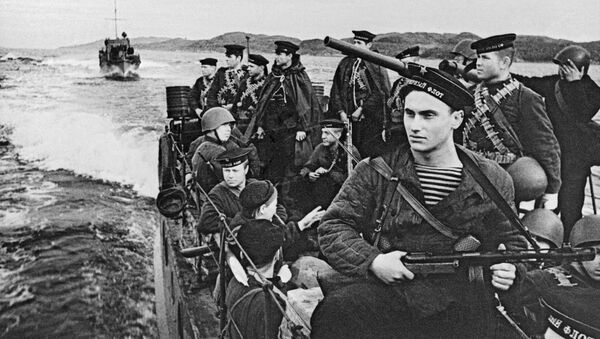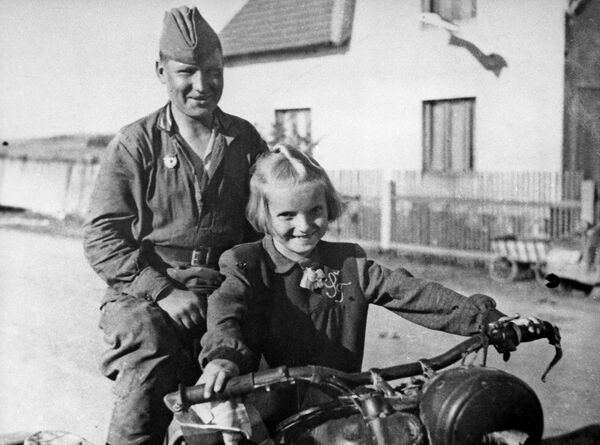Uwe Trostel is the deputy chairman of the Berlin Club of Memories and Stories of Life and a former member of the GDR Planning Commission. Recently, he spoke to Sputnik with a passionate appeal for rethinking relations with Russia due to the crisis caused by the coronavirus outbreak. Moreover, considering the experience of the GDR, he explained why former East Germans still sympathise with Russia.
'The Russians Are Coming!'
End of April 1945, Hanichen, near Reichenberg, Czech Republic. The weather was chilly and generally horrible. Often, my mother and I spent days with my grandparents. In 1938, my parents built a new house, and we moved into it the same year. Some of our relatives lived on the top floor; a Czech midwife, Mrs Berek, lived under the roof.
Staying with my grandparents saved heating and there was always something to eat, although not enough, so that hunger was our constant companion. German soldiers were constantly coming from the east, looting in search of something to eat and something to wear to finally get rid of their uniforms. My mother gave them some old clothes of my father, who had gone to war, and from whom we hadn't heard since 1943. Every time a crowd of hungry, ragged, and freezing soldiers appeared in the city, there was a glimmer of hope that one of them was my father. But hope always disappeared as quickly as it sprouted.
Mother first asked where those soldiers came from, hoping to learn something about my father, but always in vain. Even worse, the soldiers advised her to flee to the Reich, as far west as possible, as quickly as possible, because it might only be a few weeks, if not days, before the Russians would arrive.
And then, they said, the worst that could possibly happen would happen: they would randomly kill Germans, rape women, loot and burn houses.
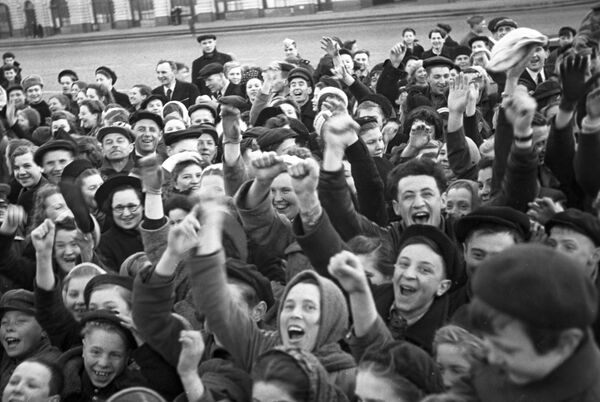
The soldiers almost panicked when talking about the horrors to be expected from the Russians, always advising my mother to "flee" to the west as soon as possible. But we had no relatives or acquaintances in Germany who could shelter us.
The days passed at the same pace: visiting my grandparents, watching German soldiers queuing in front of Tuschinsky's butcher shop when it was open, which was rarely the case anyway due to the lack of deliveries.
One day, my mother was, as usual, watching the soldiers, looking for my father among them. Suddenly she cried quietly: "The Russians are coming!" A few minutes later she cried out again: "They're occupying our house!" The house was built in 1938, not yet plastered, and was close to the forest from which the Russians came.
To the Russians, our house seemed suitable as accommodation. In the large fenced garden, they could set up tents, park their horses and equipment, and position two horse-drawn cannons. In the house itself, three officers occupied two rooms: the commander took the living room, and the two others occupied my parents' bedroom.
In the evening, we had to decide what to do next: spending the night at my grandparents' was tight and uncomfortable. With a mixture of despair, defiance, and fear, my mother took my hand and, despite my resistance, dragged me to the house. At the entrance were two Red Army soldiers, armed with rifles, ready to fire as we were approaching.
My mother said in a rather pitiful voice that this was our house and we wanted to get in. The soldiers, of course, didn't understand anything, but since mother, seeing they weren't showing aggression, insisted for us to be let in, they finally called the commander. He came, and rather rudely, but in good German, asked what we wanted. My mother explained that that was our house and we wanted to get home. The officer thought for a while and said that we would get a room. The whole house and the garden were confiscated for an indefinite period. We would have to follow all orders to avoid severe punishment.
My mother and I slept restlessly. The next morning, we watched the bustle of Russians through the window. They fed their horses and a terrible-looking – but tethered – dog, took coal from our basement, and wood from the nearby forest, as well as did many other things. It was clear that they were setting up for a long time. The officers moved the furniture, the soldiers set up three or four tents in the garden, which could accommodate 20 or 25 people.
Before lunch, the soldiers brought a field kitchen, made a fire, brought water, and started cooking something, stirring the water and adding some ingredients – we couldn’t see what it was. After a while – the stove had already been heated up, smoke was pouring out of the chimney, the water was boiling, and the smell of food spread everywhere – a line of soldiers equipped with bowls and spoons started lining up in front of it.
Meanwhile, my mother spread margarine over a small piece of bread, which we, of course, immediately ate. The smell of food from the field kitchen made our hunger unbearable. Almost fainting, we looked at the line of soldiers becoming longer and longer. My mother was desperate and finally gave me a plate and sent me to the end of the line.
The soldiers’ reaction was quite unexpected. It could be expected that they would send an additional eater away, but it turned out to be different: the last soldier in line laughed, took me in his arms, and put me on the shoulders of the one standing in front of him; and so I went on, accompanied by the laughter and hooting of the soldiers until I found myself by the stove.
The soup wasn't quite ready, so I had to wait. The soldiers were saying something to me, but I didn’t understand a word of Russian. As a result, I was saved by the cook, who took my bowl, filled it with fragrant soup, and said: "enjoy your meal" in Russian. I quickly ran to my mother, who was smiling, and we enjoyed the delicious Russian soup and were finally really full again for a very long time.
However, we "sinned": our grandmother was with us, but we completely forgot about her. My mother waited until the cook had filled the last soldier's bowl, and rather boldly approached him, pointing to the kettle and saying: "babushka, babushka…" The cook understood, scraped out the leftover food from the cauldron, and filled another bowl. So my grandmother ate well again for a long time.
The Russians stayed, and there was no sign that they were going to fight further. At the same time, there were rumours that they had already reached Berlin and that the war would soon be over. Every day we got our portion of lunch – not very much, but it was very tasty.
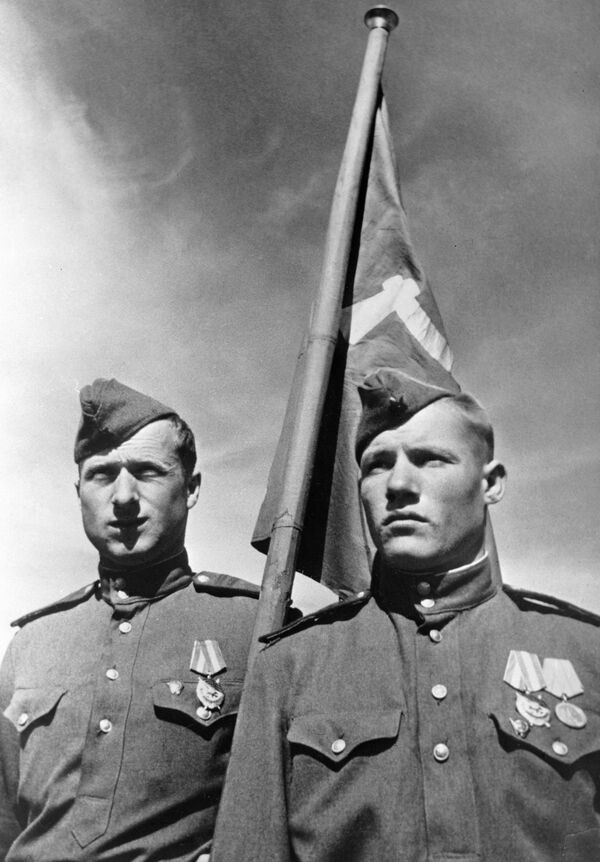
Mother suddenly started saying that the war might not last very long, and then at least we would have something to eat. Five or six days after the Russians had arrived, my mother noticed that all the dishes, linens, towels, etc. had disappeared. Apparently, the Russians stole everything. She cried and ran to the commander to complain. He was not friendly, but said that she should make a list of the missing things. With shaky hands, she wrote down the amount of cutlery, sheets, towels, etc., and gave the list to the officer. He grabbed the gun, went out into the courtyard where the soldiers’ tents were set up, pointed the gun at one of them, and shouted something (of course, we didn't understand anything).
Suddenly, towels, cups, forks, spoons, and other things flew out of the tent. The officer did the same "trick" with other tents. He told my mother to collect everything, check if everything was in place, and inform him. Mother, still trembling, counted everything, realised that everything was in place, and ran to the officer to thank him
It was then that the officer first started telling us something about his own life.
According to him, before the war, he was the director of a conservatory in Odessa; he played the piano and performed at concerts (this information is most likely not very reliable. Perhaps he was some kind of assistant professor). He was looking forward to the end of the war. Also, for the first time (neither we nor the neighbours had a radio), he told us that the war would end in a few days. He said that Soviet troops were already close to Hitler’s bunker and would probably capture it in the next few days.
Two or three days later, on 8 May, an indescribable cheer suddenly started among the Russians. They were crying: "Hooray! Hooray!" and something else that we did not understand. Among them was the commander; he had a box with bottles, which he triumphantly handed out to the soldiers.
When he saw my mother, he gave her a bottle and ordered to drink for the Soviet victory over Hitler's fascism.
He suddenly had several beer glasses in his hand that were filled with vodka. My mother had to drink one, but after the first sip, she vomited miserably, to the hooting of the Russian soldiers.
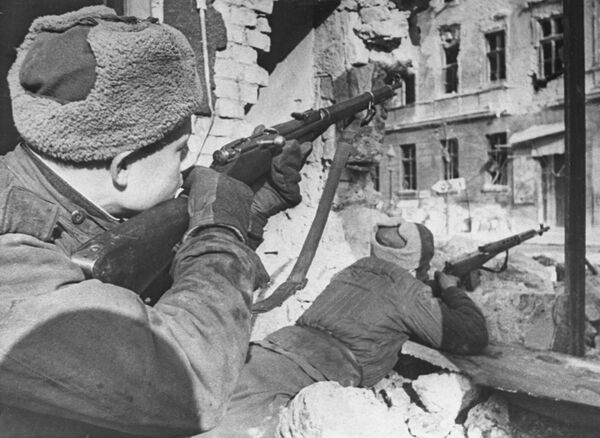
The Russians were drinking until nightfall, singing some melancholy songs, and then fell asleep. But, oddly enough, in the morning they woke up, lined up at the orders of the officer, and he delivered a speech in front of them, from which we could only understand the word “fascism". In addition, he awarded several soldiers with medals that he attached to their chests.
After the speech, the soldiers continued singing Russian songs – this time very melodic and much more melancholic than the day before, when they were drunk. Most of them had tears running down their cheeks, and suddenly my mother burst into tears too. And since I didn’t understand why they were crying, I burst into tears as well.
The officer, apparently trying to calm my mother, spoke to her. The meaning of his rather long monologue boiled down to the fact that he was trying to make her understand that Germany and all Germans, especially the children, had no prospects, so he decided to take me to Odessa. He said that there I would have the brilliant prospects that the Soviet state could offer.
My mother was terribly afraid, fell to his knees in front of him, and burst into tears, even more, begging him to have mercy and not take a child from its mother, even a German. Then his face became stern, and he said that the Germans had taken much more from him; but since she was so heartless that she was ready to leave her child to starve, not knowing what would happen next, he agreed to respect her will. My mother felt relieved, she hugged him and wished him and his family all the best.
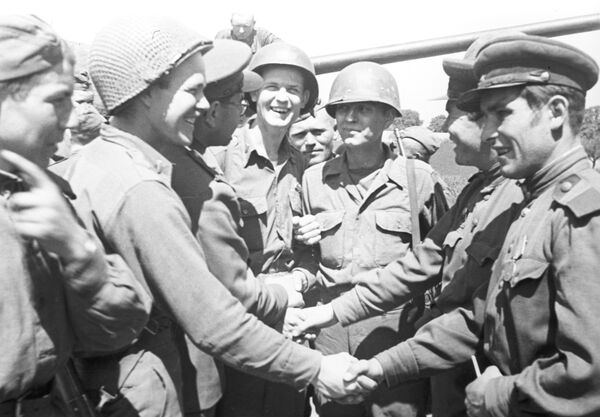
Suddenly the Russians started hurrying – everyone wanted to get home as soon as possible. They started loading their wagons, harnessed two horses, attached a cannon to them, and set off singing. In a hurry, they left some stuff, and these items came in handy for us in the following days and weeks.
And they left their huge shaggy dog. While they were here, no one dared to approach the dog – it barked and bared its teeth so that everyone was afraid. But having realised that it had been left alone, the dog suddenly became harmless, like a lamb.
It crawled towards us, licked my mother’s hands, and looked completely different from before. However, this didn’t save it: the butcher’s wife, Mrs Tuschinsky, lured it to their place, and over the next few days we could eat meat again. This is not to say that it was very tasty, but at least we had food…
